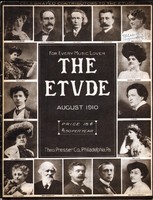The prominent part played by music in the death of King Edward VII recalls to one's mind the fact that music not only serves to voice a nation's mourning, but is also a means of giving vent to national joyousness in the time of victory. A familiar instance of this is Tschaikowski's 1812 Overture, which was composed, by special commission, to celebrate the retreat of the French from Moscow. This work has become very popular, though the composer was not inclined to regard it as one of his most important works. It is not generally known, however, that Beethoven also composed a "battle-, piece" of a similar nature.
This was done at the instance of his friend, Maelzel, the reputed inventor of the Metronome. This composition was in celebration of the then- recent victory of Wellington over Napoleon at Vittoria. Beethoven was induced to arrange a "Battle Symphony" in which he introduced the British army by the tune of Rule Brittania, later introducing Malbrook in a dismal form. After depicting the horrors of warfare, the English victory was signalized by the use of God Save the King, accompanied by effects suggesting the cheering of the crowd. This work was actually performed at a concert given in aid of the Bavarian and Austrian soldiers injured at the battle of Hanau.
Beethoven was induced to conduct the work, stipulating, however, that his recently composed Seventh Symphony should also be included in the program, which consisted entirely of Beethoven's compositions. The occasion was an enormous popular success. The orchestra was particularly fine, as many eminent musicians showed their patriotic fervor by assisting. Moscheles, already a great pianist, played the cymbals. Meyerbeer took charge of the drums. Spohr, Salieri, Romberg and Hummel also lent valuable assistance. Beethoven was immensely pleased with the whole affair, and declared that had he not been conducting he would gladly have played the big drum, or done anything else that would have assisted in such a noble cause. The "Battle Symphony," however, is not usually included among his works, and has never been played since.



